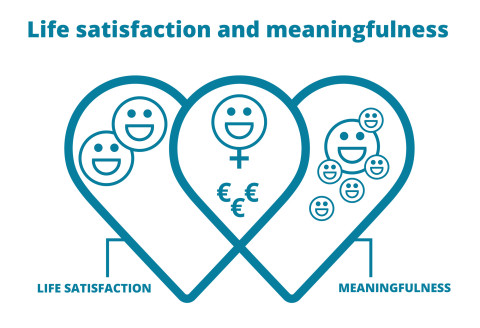Looking into factors explaining people’s happiness in Finland, researchers found that when it comes to money, having enough is more important than having a lot.
- Text Sari Eskelinen Photos Raija Törrönen and Sakari Röyskö
“Finns have a superpower: they are good at being ordinary. If we wanted to increase people’s experiences of life being good and meaningful, we should draw more attention to being ordinary,” Professor Arto O. Salonen says.
Salonen has a long history of studying sustainable lifestyles and their associations with people’s well-being in Finland, and this makes him more than well-qualified to explain why the World Happiness Report keeps ranking Finland as the happiest country in the world, year after year. So, what makes life good and happy for Finns?
Salonen became interested in issues related to sustainability and well-being 15 years ago, when he was living in Africa. There, poor people were paying for the consequences of climate change with their lives, while affluent industrialised countries were still trying to figure out whether human-induced climate change even existed.
“There was a lot of talk about how climate change mitigation would hurt economic growth forecasts. Indeed, those who had the least to do with accelerating climate change had to suffer its gravest consequences, such as worsening spells of drought, and floods.”
When it comes to material wealth, affluent industrialised countries have reached a saturation point. Having dozens of flavours of yoghurt to choose from in the corner store, and average households having tons of different appliances lying around, are signs of unprecedented overabundance.
“And yet, our society is dependent on economic growth, so enough will always be a little more than what we currently have.”
This contradiction has led Salonen to explore factors affecting people’s perceived well-being as well as factors contributing to a good, meaningful life in affluent societies.
Our society is dependent on economic growth, so enough will always be a little more than what we currently have.”
Arto O. Salonen
Professor
Having enough money explains happiness
In a study published in January 2023, Salonen and Principal Lecturer Jyrki Konkka from Metropolia University of Applied Sciences examined factors contributing to a good life among Finns. More than 2,000 Finns, aged between 18 and 79 years, responded to the survey.
“We found that there were no happiness differences between Finns from different income groups. But what is interesting is that perceived financial success explains happiness. It boils down to finding a meaningful way to live in the conditions people find themselves in. It is crucial to be able to tell endless wants apart from actual needs. It seems that Finns could separate their needs and desires relatively well.”
According to Salonen, being ordinary brings satisfaction to Finnish people’s lives and is a strength that should be more actively discussed within the Finnish society.

Meaningful life is emphasised by families with children, life satisfaction by couples
The study explored Finns’ life satisfaction as well as experiences of meaningfulness in life. People’s place or type of residence did not explain perceived life satisfaction or experiences of meaningfulness in life. There were no differences between people living in cities and urban areas, and the same was true for homeowners and renters: their life satisfaction and experiences of meaningfulness in life were similar.
However, couples were more satisfied with their lives than families with children, or those living alone. Experiences of meaningfulness and value in life were more common among families with children than among couples without children, or among those living alone.
“It’s easy to understand this because life satisfaction is based on feelings of pleasure. In the everyday life of families with children, it is more difficult to lead a spontaneous, pleasure-centred life than when living alone or with a partner. Being there for others gets highlighted in families with children, and this is key to experiencing meaningfulness. When thinking about the future of their children, people start thinking in an intergenerational way, and taking sustainability into consideration starts generating experiences of meaningfulness.”

Women are more satisfied and happier with their lives than men
The study also found that in Finland, women are more satisfied with their lives than men. They also have more experiences of meaningfulness in life than men, and their lifestyles are more sustainable.
“One could conclude that sustainable well-being is feminine by nature.”
But what makes women more satisfied and happier with their lives than men? Salonen believes that Nordic gender equality contributes to women’s happiness in Finland.
“In Finnish workplaces, for example, women nowadays have pretty much the same opportunities as men. And perhaps Finnish women have the kind of guts, determination and perseverance that adds to their life satisfaction, despite Finland also having its share of factors that weaken life satisfaction, such as domestic violence.”
Sustainable life more than scarcity and compromise
Based on the study by Salonen and Konkka, a sense of being ordinary and upholding sustainable lifestyles are factors explaining happiness in Finland. As the world is struggling with sustainability transitions, these findings give reassurance.
“People often think that sustainability transitions are about scarcity, struggle and compromise. However, according to our studies, combining life satisfaction, meaningfulness, and a sustainable lifestyle is possible. This is promising as in Finland, the target of a carbon-neutral society by 2035 has been laid by law, ensuring that the whole society is engaged in a sustainability transition.”
Salonen’s previous studies, too, have found that people who take up more sustainable lifestyles – where possible – end up being more satisfied with their lives. For example, starting to use public transportation improved people's satisfaction with life.

A 2018 study by Arto O. Salonen, Jani Siirilä and Mikko Valtonen found that recycling is part of Finnish people’s everyday routine and habits. Finns also favour domestic food and products, and they are interested in the origin of materials. In 2018, smart, carbon-free mobility was still a challenge, although 20% of Finns reported consideration of environmental effects when planning their holidays.
Another study by Salonen and Elina Lehikoinen, on the other hand, looked at food preferences among 30–60-year-old Finns. They found that the transition to more sustainable diets could be facilitated by the ensuing health benefits, such as weight loss, as well as by ecological benefits. Based on the study, middle-aged high-income men were most reluctant to adopt sustainable diets.
Safety and trust as the cornerstones of happiness
In the Finnish society, social stability and trust between people are the cornerstones of happiness. Practical manifestation of this trust include people having trust in social institutions and in the way they perform their duties. And thanks to a low level of corruption, citizens can count on being treated equally.
“There are, however, also threats that can shake this trust, such as polarisation of interaction. Especially on social media, solution-driven dialogue is often reduced to debate, where people pick their sides and, ultimately, the winners. This type of interaction is far removed from trying to connect with people and welcoming different viewpoints to broaden one’s own horizons. It remains to be seen whether this is something that will undermine trust between people in the Finnish society.”
Finland has genuine potential to come up with solutions for the rest of the world, and that’s an opportunity worth seizing.
Arto O. Salonen
Professor
Solution-driven approach as Finland’s new country brand
Salonen points out that the most noble form of interaction between people is joint reflection and search for solutions. According to him, this kind of a solution-driven approach is a particular strength among Finns, one that could even become a new country brand for Finland, as the world is trying the implement sustainability transitions on a planet that is threatened by climate change, the sixth mass extinction and depletion of natural resources.
Finland has genuine potential to come up with solutions for the rest of the world, and that’s an opportunity worth seizing. Finns have a reputation of being fair, reliable and trustworthy: we don’t just talk the talk but will also walk the walk.
And this is something that should be advertised more boldly.
“But there is also something beautiful in our modesty. It’s that quality of being ordinary that helps us to focus on what we have instead of what we don’t. The moment we’re able to determine what constitutes enough, our glass will always be half full.”
Sustainability transitions challenge societies to find ways to adapt
Will Finland remain among the happiest countries in the world also in the future? At least the country’s social conditions support this. Finland is a stable society. The country’s well-functioning education system and citizens’ strong trust in social institutions are the cornerstones of well-being. The Finnish justice system is independent, and the country’s banks are stable. Crime, including organised crime, is low.
“In this regard, we’re incredibly well set for a good life."
According to Salonen, global challenges are forcing societies that are dependent on economic growth to find ways to adapt. Sustainability scholars, in particular, are concerned about getting stuck on economic growth, as it often means increasing use of natural resources and higher emissions.
It seems that an ecowelfare state, one that is independent of growth, would open the door to a sustainable and happy future.
Teemu Koskimäki
Postdoctoral Researcher
Published in May, a study by Postdoctoral Researcher Teemu Koskimäki found that an overwhelming majority of sustainability scholars support post-growth pathways for affluent countries already this decade. Nearly five hundred sustainability scholars from over sixty countries were interviewed for the study.
“Researchers emphasise that our focus should shift from growth to well-being and reduction of environmental harm. There is an urgent need to consider post-growth strategies, particularly in affluent countries. Indeed, it seems that an ecowelfare state, one that is independent of growth, would open the door to a sustainable and happy future, and Finland is in a great position to develop this type of a model,” Koskimäki points out.
Read more on this topic:
Arto O. Salonen, Jyrki Konkka. Kansalaisten hyvinvointi kestävyyttä tavoittelevassa yhteiskunnassa. Yhteiskuntapolitiikka 2022, 47(4). https://journal.fi/tiedepolitiikka/article/view/117852
Sakari Höysniemi, Arto O. Salonen. Towards Carbon-Neutral Mobility in Finland: Mobility and Life Satisfaction in Day-to-Day Life. Sustainability 2019, 11(19). https://www.mdpi.com/2071-1050/11/19/5374
Elina Lehikoinen, Arto O. Salonen. Food Preferences in Finland: Sustainable Diets and their Differences between Groups. Sustainability 2019, 11(5). https://www.mdpi.com/2071-1050/11/5/1259
Arto O. Salonen, Jani Siirilä, Mikko Valtonen. Sustainable Living in Finland: Combating Climate Change in Everyday Life. Sustainability 2018, 10(1). https://www.mdpi.com/2071-1050/10/1/104
Teemu Koskimäki. Targeting socioeconomic transformations to achieve global sustainability. Ecological Economics 2023, 211(107871). https://doi.org/10.1016/j.ecolecon.2023.107871

